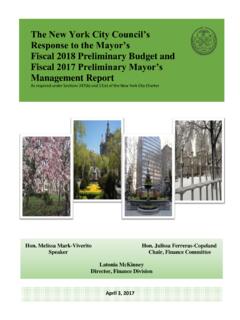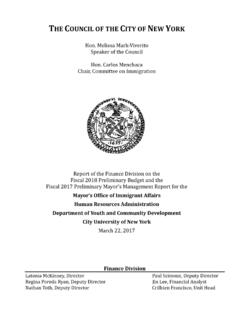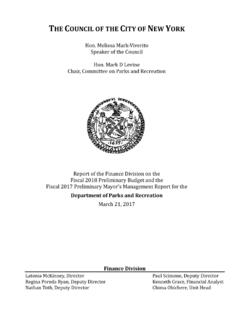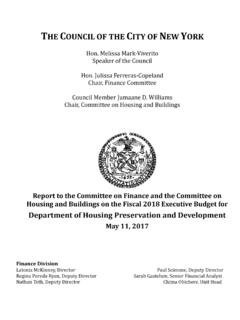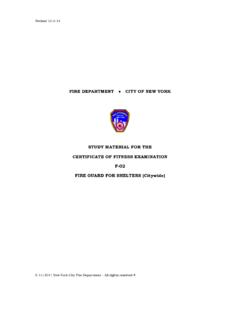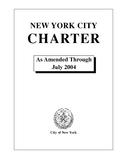Transcription of Discretionary Funding Policies and Procedures
1 Discretionary Funding Policies and Procedures [Year] Discretionary Funding Policies and Procedures New York City Council January 2019 City Council Discretionary Funding Policies AND Procedures Preface Each year, Members of the Council allocate Discretionary funds to not-for-profit organizations in order to meet local needs and fill gaps in City agency services. Thus, Discretionary spending is a critical tool in meeting needs in our communities. As with all taxpayer funds, the public deserves to know that Discretionary funds are going to organizations with the capacity and integrity to provide quality services. The City Council has instituted a comprehensive set of measures to improve transparency and accountability in the use of Discretionary Funding including: o publishing a complete list of organizations receiving Discretionary funds, including the amount, the sponsoring Member or Members, and a brief description of how the funds are to be used; o working in conjunction with the Mayor s Office of Contract Services (MOCS) and City agencies, a thorough vetting process is in place to review each organization allocated Discretionary funds to assess integrity, compliance, and a track record in providing the services for which they have been selected to provide.
2 And o ensuring that recipient organizations and Members comply with the specific set of rules and guidelines that govern Discretionary funds which the City s Conflicts of Interest Board (COIB) clarified at the Council s request. All organizations receiving funds are subject to these rules, and Council Members provide signed conflicts of interest disclosure forms with each vote approving Funding . This guide outlines the Discretionary Funding Policies and Procedures of the New York City Council. It is for use by not-for-profit organizations seeking Council Discretionary funds, Member offices, and the public. We tremendously value community partners and the important work accomplished in the constituencies.
3 Thank you for working with us and our partners in government to implement measures critical to ensuring the future of the services you provide. Speaker Corey Johnson New York City Council Discretionary Funding Policies and Procedures | 2 1. What is Discretionary Funding ? Discretionary Funding is a duly appropriated sum of money in the City s expense budget allocated to an eligible not-for-profit organization by the Council or a Member of the Council under section 1-02(e) of the rules of the Procurement Policy Board (PPB). PPB Rule 1-02(e) allows certain elected officials including Council Members and Borough Presidents (but not the Mayor or City agencies) to designate specific not-for-profit organizations to receive Funding as an alternative to Funding programs through competitive procurement.
4 Unlike competitively awarded Agency contracts, awarded Discretionary funds contracts are for a single fiscal year. Types of Discretionary Funding There are several categories of Discretionary Funding used by the City Council, each serving different purposes. The following categories have developed through Council practice over the years, and are subject to change in the future. Member Local Initiatives: Each Member of the Council receives an amount each year to meet local needs in the Member s district, known as local initiatives . Borough Delegations also allocate Funding . Va ri ou s f a ct o rs in c l u di n g local needs, the Member s request, and other considerations determine the amount.
5 Uses of local initiative Funding are not limited to any particular purpose or agency, except as otherwise restricted by Council policy, PPB rules, and applicable law. City Council Local Initiatives: Organizations may apply for Funding directly to the Speaker, or Members may request that the Speaker fund an organization whose scope of services exceeds their individual ability to fund or which serves a larger geographical area. This is often referred to as the Speaker s list. Member Aging Discretionary Funds: Each Member receives an annual amount to fund senior services in his or her district through the Department for the Aging. Member Youth Discretionary Funds: Each Member receives an annual amount for the provision of services for youth or community development through the Department of Youth and Community Anti-Poverty Initiative: Council Members receive additional Discretionary Funding based on the number of people in their districts below the Federal Poverty Line; compiled by the American Community Survey (ACS).
6 ACS is a continuous survey that individuals respond to throughout the year. Poverty 1 For youth programs, services may only be provided outside of school hours. In-school programming must be funded through the Department of Education, with the agreement and consent of the principal(s) of the school(s) where services will be provided. New York City Council Discretionary Funding Policies and Procedures | 3 statistics presented in ACS reports and tables adhere to the standards specified by the Office of Management and Budget (OMB). Based on these figures, Council Members will receive additional funds ranging from $25,000 (Lowest Poverty Figures) to $100,000 (Highest Poverty Figures) in $25,000 increments.
7 citywide Initiatives: The Council may also initiate programs for addressing community needs that it feels are lacking by existing agency programming. To extend the reach of agency programs to underserved communities or populations. In most cases, the Council will provide Funding to specific not-for-profit providers. Initiatives are usually citywide in scope, although they may focus on high-need communities or populations. The method of allocating Funding varies by initiative and is at the discretion of the Council. Council Reporting on Discretionary Funds At budget adoption, allocations of Council Discretionary Funding are disclosed. Periodic updates occur to reflect any changes to the adopted budget.
8 Schedule C At budget adoption for the upcoming fiscal year, the City Council Finance Division prepares a supporting schedule the Schedule C; detailing the changes made to the Mayor s Executive Budget by the Council s allocation of Discretionary Schedule C lists all the Discretionary designations that at the time of adoption, including, for initiatives, a short description of initiative programmatic goals. Transparency Resolutions Some initiatives are funded in the Adopted Budget, but specific designations of not-for-profit providers are made later in the year. New designations, alterations and/or corrections occur via Transparency Resolutions. The Finance Committee approves Transparency Resolutions, which the entire Council votes on.
9 All new designations and changes to previous designations including changes to the purpose or amount of Funding must be approved in a Transparency Resolution before such change can take effect. Expense Budget Modifications Expense Budget Modifications are a requirement by the New York City Charter in order to make certain changes to the Adopted Budget midyear. Pursuant to section 107(b) of the Charter, an Expense Budget Modification is required when Funding is: 1) transferred between agencies, or 2) when Funding within a unit of appropriation is increased or decreased by more than five 2 The document is referred to as Schedule C because the Mayor s Office of Management and Budget prints two supporting schedules A and B that respectively detail the changes to the budget between the Executive Budget and the Adopted Budget by agency and unit of appropriation These schedules reflect the changes set forth in Schedule C, as well as negotiated adjustments to the budget and other technical adjustments made by the Administration.
10 New York City Council Discretionary Funding Policies and Procedures | 4 percent or fifty thousand dollars, whichever is greater. These modifications are submitted by the Mayor to the Council after which the Council has thirty days from receipt of the modification to disapprove it. When the Council makes or changes designations in a Transparency Resolution that requires shifting/moving Funding , described in one of the above-listed categories, such Funding shift cannot take effect until Council approval via an Expense Budget Modification. On-line Database An on-line database on the Council s website makes it convenient to search for information on Discretionary allocations.


